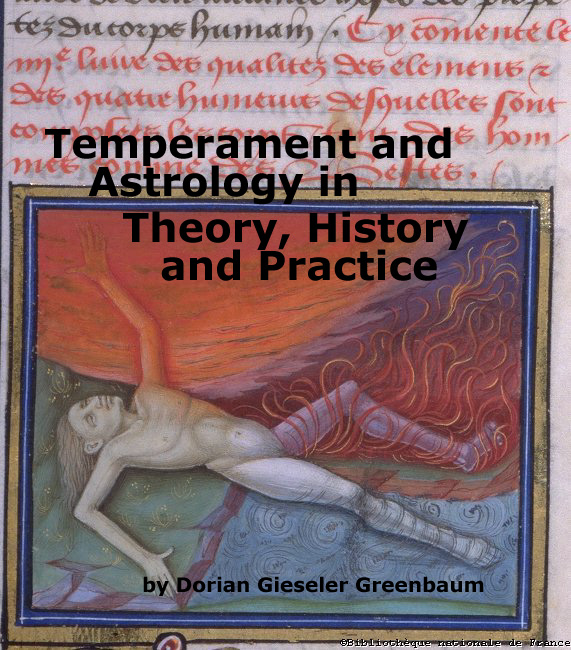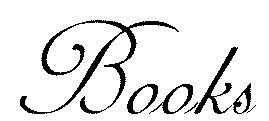![]()

Temperament: Astrology's Forgotten Key
The process of assessing temperament in the birth chart has long been avoided by all but the bravest souls, and yet it is of vital importance if the chart is to be properly understood. In this ground breaking work, Dorian Gieseler Greenbaum uses her experience in teaching both classics and astrology to bring temperament back into mainstream astrological practice. She covers the history of this technique from ancient times, discussing various approaches and their merits, then presents a simplified version suitable for all levels of astrologer. Copious case histories and studies help to demonstrate her points and make this a fascinating read.
Click here for an excerpt from the book.


Published by ARHAT, 2001
Phone
(for orders only) : 800-475-2272 The cost
is $35.00 . If you’d
like to see an excerpt from my book, click here . If you’d
like to read a review of my book,
go to http://www.windandsky.com/book_reviews/book_paulas_alexandrus.html Thank you to Jonathan James for this.
![]() You can order my book from The Astrology
Center of America, http://www.astroamerica.com/arhat.html#g29
You can order my book from The Astrology
Center of America, http://www.astroamerica.com/arhat.html#g29![]()

From the
Foreward to my book, by Robert Hand:
This set of translations by Dorian Gieseler Greenbaum is the first complete translation into English of the entire corpus of astrological writings stemming from, and including, the original Introductory Matters written by Paulus Alexandrinus. In addition to Introductory Matters itself, this corpus consists of numerous short commentaries or scholia added by Byzantine commentators, and the extensive commentary originally attributed to one Heliodorus (about whom we know little) but now generally attributed to Olympiodorus, an important commentator on Aristotelian philosophy from the early Byzantine period. Indeed the Olympiodorus commentary is almost as long as the original Introductory Matters and a work of comparable importance in its own right. …
What We
Gain
What does the new material add to what we already had? A great deal! First of all the Introductory Matters is an extremely terse text. It was clearly written as an adjunct to oral instruction assuming that someone would be available to explain many complicated concepts and implicit principles. … Also, while the Paulus material seemed to be quite interesting on its own merits, it did not seem as revolutionary and unique as some of the other ancient Greek authors. The scholia and Olympiodorus commentary change all of this.
First of all, the commentaries clarify most of the unclear and ambiguous aspects of Paulus even if we grant the possibility that the commentators may have misunderstood him. What they reveal seems completely consonant with what Paulus was saying. And Olympiodorus in particular was not long after Paulus and almost certainly practiced in the same tradition, being from the same place and general cultural milieu. The result is that we have a fairly complete basic astrological method rather than the somewhat terse and often merely suggestive text of the Introductory Matters.
Second, we see in the combination of Paulus and Olympiodorus that late Greek Astrology was in fact much closer to the early Arabic than has generally been recognized. While the Arabic tradition clearly picked up much from the Persian that was not to be found in the Greek tradition, some of the methods that achieved such prominence in the Arabic tradition are already found in the Paulus-Olympiodorus tradition. The two outstanding instances of this are the use of large numbers of Lots, the so-called “Arabic” Parts, and at least the beginnings of the elaborate Persian-Arabic doctrine of Solar Revolutions. The Paulus-Olympiodorus material shows us much of the Greek tradition just before the Arabic invasions of the Byzantine empire carried Greek Astrology into the Middle Eastern world where it combined with Persian and Indian traditions (much more the former than the latter) giving rise to the Arabic and later Latin medieval traditions of Astrology from which modern Western Astrology is descended. …
We believe that this edition of the Pauline material will be of interest both to astrologers, and scholars interested in the History of Astrology.

![]()
 Paulus
& Olympiodorus
Paulus
& Olympiodorus  Temperament
Temperament  Articles
Articles
 Home Page
Home Page  Lectures
Lectures  Consultations
Consultations
 The
Astrology Institute
The
Astrology Institute  Bio
Bio  Email me
Email me
![]()
Last Updated 3 June 2005
